China Evergrande Group Bundle
Who Really Owns China Evergrande Group?
Unraveling the ownership of China Evergrande Group is crucial to understanding its dramatic rise and fall. The company's story, marked by rapid expansion and eventual financial distress, serves as a stark reminder of the power dynamics inherent in corporate structures. Understanding who held the reins of this real estate giant is key to grasping the implications of its China Evergrande Group SWOT Analysis and its impact on the broader market.
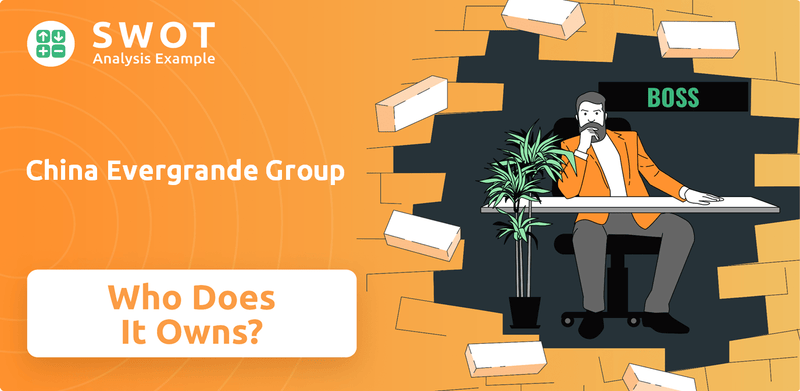
The complex web of Evergrande ownership, encompassing its founder, investors, and public shareholders, played a significant role in shaping its destiny. As one of the largest players in the Evergrande real estate market, the company's debt and the subsequent crisis sent shockwaves through the Chinese property market. Exploring Evergrande ownership provides critical insights into the company's strategic decisions and the factors that contributed to its current financial situation.
Who Founded China Evergrande Group?
The China Evergrande Group, a major player in the Chinese property market, was established in 1996. The founder, Xu Jiayin (also known as Hui Ka Yan), launched the company in Guangzhou. Initially, the firm operated under the name Hongda Group.
The early ownership structure of China Evergrande Group was primarily centered around Xu Jiayin. His strategy involved significant borrowing to acquire land, followed by pre-selling properties to generate cash flow. This approach funded debt repayment and facilitated the financing of new projects.
This business model proved highly successful for approximately two decades, contributing significantly to Xu Jiayin's rise as one of China's wealthiest individuals. The company's growth and market dominance were directly linked to its ownership structure and strategic decisions.
Xu Jiayin was the founder and held a substantial majority stake. The company's early success was driven by his vision and control.
Early investors were crucial for the company's initial growth phases. While their specific stakes are not as detailed, they played a key role.
The aggressive expansion strategy relied on pre-sales and leveraging debt. This model fueled rapid growth and market penetration.
As of December 2021, Xu Jiayin remained the largest shareholder. He held nearly 60% of the company's stock, maintaining significant control.
Evergrande's early strategy directly shaped its influence in the Chinese property market. The company's decisions had a significant impact.
The company's expansion was heavily reliant on debt, which later contributed to its financial difficulties. This model was key to its early growth.
As of December 2021, Xu Jiayin held a substantial majority of the shares, indicating his control over the company. The Growth Strategy of China Evergrande Group highlights the company's early focus on aggressive expansion. Early investors, though not always publicly detailed, played a crucial role in the company's initial growth. The company's reliance on debt and pre-sales, while initially successful, later contributed to the Evergrande debt crisis. Understanding the Evergrande ownership structure is key to analyzing its financial health and its impact on the Chinese property market.
Early ownership was centered on Xu Jiayin, who held a significant stake.
- Xu Jiayin founded China Evergrande Group in 1996.
- The company's initial strategy involved heavy borrowing and pre-sales.
- As of December 2021, Xu Jiayin held nearly 60% of the stock.
- Early investors supported the company's growth phase.
China Evergrande Group SWOT Analysis
- Complete SWOT Breakdown
- Fully Customizable
- Editable in Excel & Word
- Professional Formatting
- Investor-Ready Format
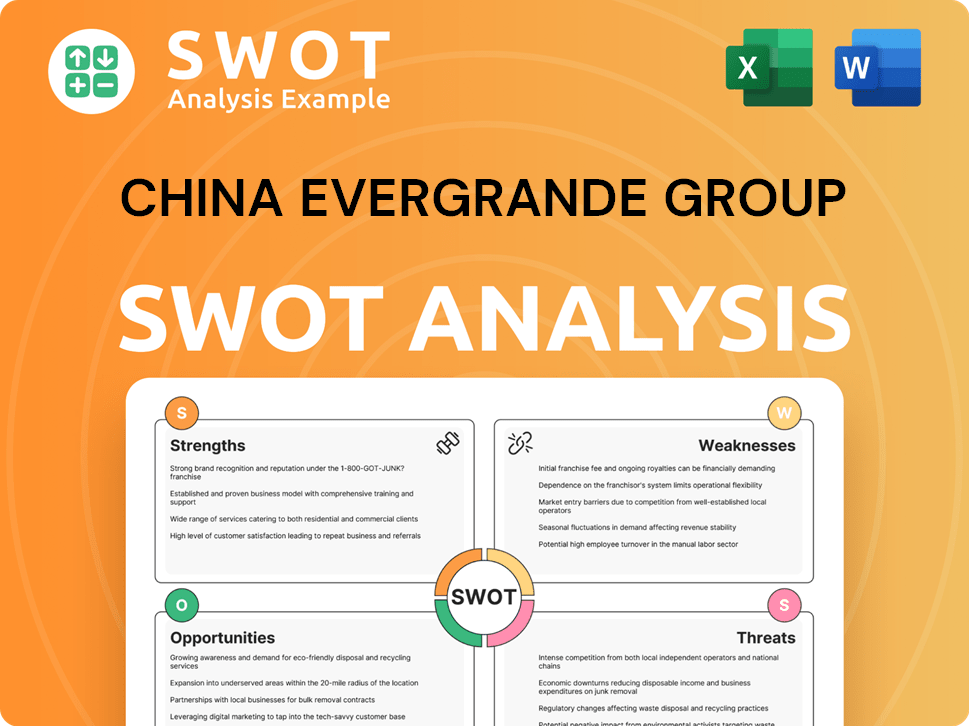
How Has China Evergrande Group’s Ownership Changed Over Time?
The evolution of Evergrande's ownership structure is marked by significant events. The company went public on the Hong Kong Stock Exchange in October 2009 through an initial public offering (IPO), raising $722 million. By 2010, it had become China's second-largest property developer by sales, setting the stage for further expansion and changes in its ownership landscape. Starting in 2015, Evergrande diversified into sectors like healthcare, tourism, and electric vehicles, which also influenced its ownership dynamics.
Xu Jiayin (Hui Ka Yan), the founder, initially held a dominant position. However, the company's debt crisis led to a significant reduction in his stake. In November 2021, Xu Jiayin sold 1.2 billion shares, decreasing his ownership from 77% to 67.9%. Further sales of pledged shares followed in December 2021. As of October 2023, his estimated net worth had plummeted to $979 million from a peak of $45.3 billion in 2017, reflecting the severe impact of Evergrande's financial troubles on his personal holdings.
| Event | Date | Impact on Ownership |
|---|---|---|
| IPO on Hong Kong Stock Exchange | October 2009 | Raised $722 million, established public ownership |
| Diversification into New Sectors | Starting 2015 | Expanded business scope, potentially attracting new investors |
| Xu Jiayin Share Sales | November & December 2021 | Reduced founder's stake significantly |
| Shenzhen Government Investment | 2017 | Increased state involvement in Evergrande's real estate assets |
Major stakeholders have included institutional investors, with the Shenzhen government becoming a significant shareholder in Evergrande's real estate assets (Hengda Real Estate Group Co., Ltd.) in 2017, acquiring 25% of its shares. CITIC Group, linked to the PRC central government, is also a shareholder. While specific current percentages for all institutional investors are not readily available due to the ongoing liquidation, past significant investors have included China Life Insurance Asset Management Co., Ltd., Changsheng Fund Management Co., Ltd., Blue Pool, CICC Asset Management, Keywise Capital Management (BJ) Ltd., Credit Suisse, Goldman Sachs, and Merrill Lynch. Institutional ownership data from May 2024 for China Evergrande Group (OTCPK:EGRNF) shows two institutional owners holding a total of 61,000 shares, with Allianz Variable Insurance Products Trust and Ancora Advisors, LLC as the largest. These changes, particularly the increased government and state-linked investment, reflect attempts to stabilize the company and mitigate broader economic risks. To understand more about the financial aspects, you can explore the Revenue Streams & Business Model of China Evergrande Group.
The ownership structure of Evergrande has seen major shifts due to the debt crisis and strategic investments.
- Founder's stake significantly reduced.
- Increased involvement from state-linked entities.
- Institutional investors adjusting their positions.
- Ongoing liquidation impacting shareholder dynamics.
China Evergrande Group PESTLE Analysis
- Covers All 6 PESTLE Categories
- No Research Needed – Save Hours of Work
- Built by Experts, Trusted by Consultants
- Instant Download, Ready to Use
- 100% Editable, Fully Customizable
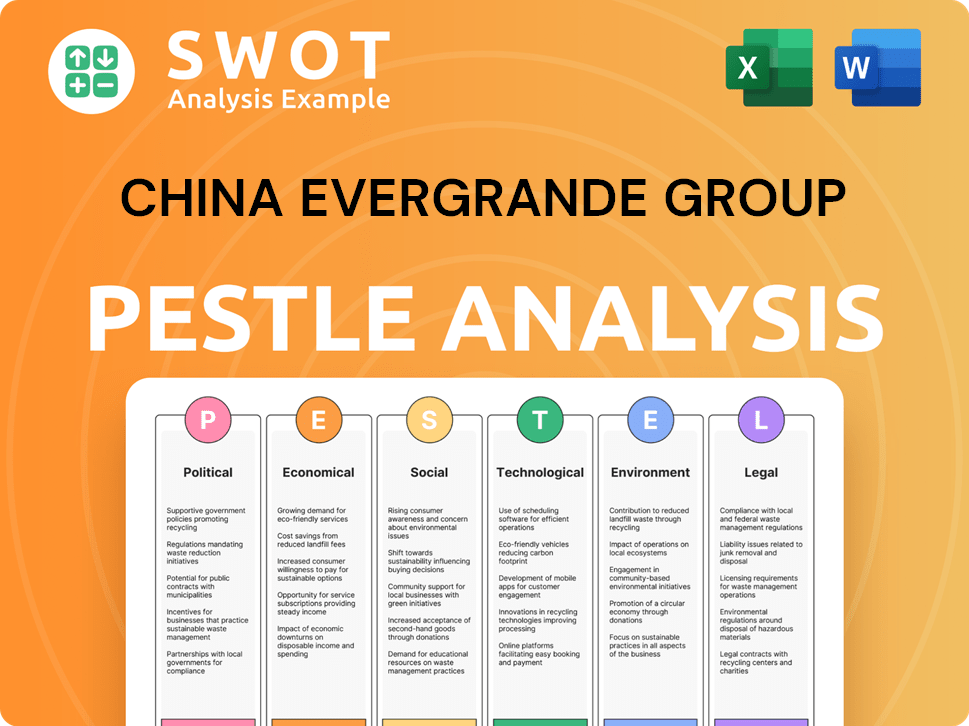
Who Sits on China Evergrande Group’s Board?
As of May 16, 2025, the board of directors of China Evergrande Group (in liquidation) includes executive directors such as Mr. Hui Ka Yan (Chairman), Mr. Siu Shawn (Chief Executive Officer), Mr. Shi Junping, Mr. Liu Zhen, and Mr. Qian Cheng. Mr. Liang Senlin serves as a non-executive director, and Mr. He Qi and Ms. Xie Hongxi are independent non-executive directors. For its subsidiary, China Evergrande New Energy Vehicle Group Limited, as of February 3, 2025, the executive directors are Mr. Siu Shawn and Mr. Choi Wai Hong Clifford, while independent non-executive directors include Mr. Xie Wu, Mr. Vincent Gar-Gene Leung, and Ms. Carina Man Yee Foo.
The leadership structure reflects the ongoing transition due to the company's financial difficulties. The presence of liquidators indicates a shift in control, with the focus now on managing assets and addressing the substantial debt. The Growth Strategy of China Evergrande Group details the company's past expansion and the factors contributing to its current situation. The board's composition, including independent directors, is crucial in overseeing the restructuring and ensuring compliance during this period.
| Director Type | Name | Title |
|---|---|---|
| Executive Director | Hui Ka Yan | Chairman |
| Executive Director | Siu Shawn | Chief Executive Officer |
| Independent Non-Executive Director | He Qi | Director |
Historically, the founder, Xu Jiayin, held significant voting power. However, with the liquidation order in January 2024 and the ongoing legal proceedings, the power dynamics have shifted. Xu Jiayin was fined $6.5 million and banned for life from China's securities markets in March 2024 due to the company's $78 billion revenue overstatement. The company's debt crisis and the subsequent restructuring have led to significant changes in governance. These events have dramatically reshaped decision-making, with liquidators now overseeing the company's assets and restructuring efforts. The focus is now on managing the Evergrande debt and navigating the complexities of the Chinese property market.
The board of directors has undergone significant changes due to the Evergrande debt crisis and liquidation proceedings.
- The founder's influence has diminished due to financial misstatements and legal actions.
- Liquidators are now in charge of managing assets and restructuring efforts.
- Independent directors play a crucial role in overseeing the process and ensuring compliance.
- The focus is on resolving the Evergrande debt and its impact on the Chinese economy.
China Evergrande Group Business Model Canvas
- Complete 9-Block Business Model Canvas
- Effortlessly Communicate Your Business Strategy
- Investor-Ready BMC Format
- 100% Editable and Customizable
- Clear and Structured Layout
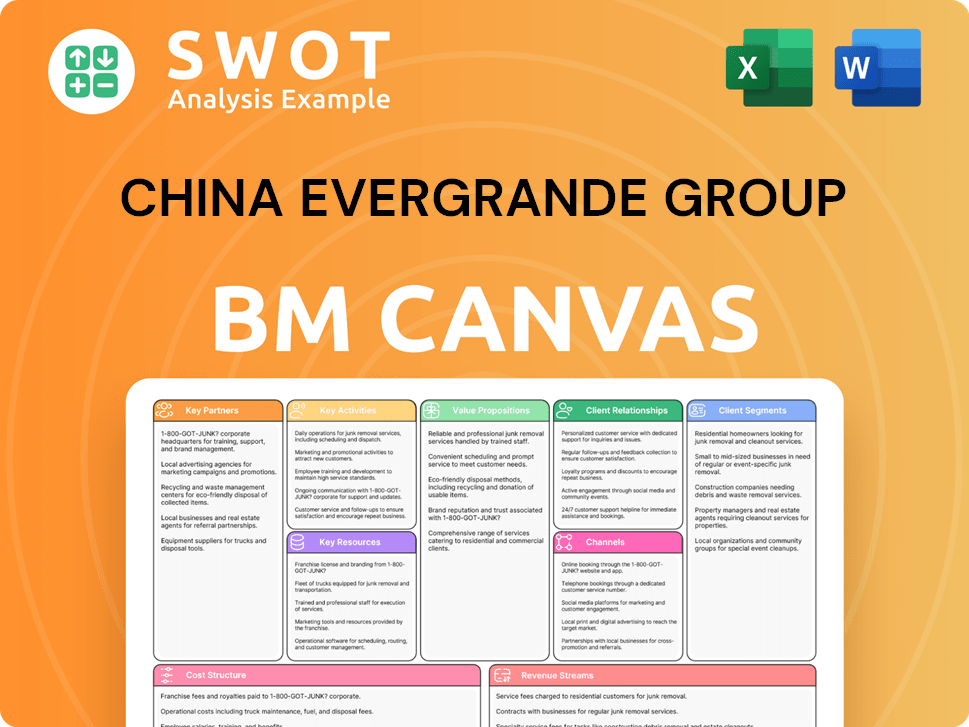
What Recent Changes Have Shaped China Evergrande Group’s Ownership Landscape?
The past few years have brought significant changes to the ownership structure of China Evergrande Group, largely due to its severe financial difficulties. A Hong Kong court ordered the liquidation of China Evergrande Group in January 2024, after the company failed to present a viable restructuring plan for its estimated $300 billion in liabilities. This situation has led to a suspension of trading in the company's shares, reflecting the drastic impact of the debt crisis on its ownership profile. The Marketing Strategy of China Evergrande Group has been significantly impacted by these events.
Key trends include substantial dilution of the founder's stake and increased government involvement. Xu Jiayin's holdings have been significantly reduced through forced sales of pledged shares and other asset disposals. The Shenzhen government and state investors have become major shareholders in Evergrande's real estate assets, signaling state-directed restructuring and asset acquisition to manage the troubled firm. This shift indicates a move away from private control towards a more fragmented ownership structure under liquidation.
| Event | Date | Impact |
|---|---|---|
| Liquidation Order | January 2024 | Suspension of share trading, asset disposition. |
| Founder's Stake Reduction | Ongoing | Forced sales of shares to meet obligations. |
| Government Intervention | Ongoing | State-led restructuring, asset acquisition. |
Evergrande's subsidiaries have also been affected. For example, its electric vehicle unit, China Evergrande New Energy Vehicle Group, has been actively seeking strategic investors since at least February 2025 to address its liquidity issues. Discussions are ongoing for the sale of Evergrande's 58.5% stake in its EV business. Leadership changes have also been seen, with several executives of Evergrande Life Assurance reportedly uncontactable in November 2024. Additionally, there have been changes in the board composition for China Evergrande New Energy Vehicle Group, including the appointment of new independent non-executive directors in late 2024 and early 2025.
Xu Jiayin's stake in Evergrande has been drastically reduced due to forced sales and asset disposals to meet financial obligations. This reflects the company's struggle to manage its debt crisis, impacting its ownership.
The Shenzhen government and state investors have become major shareholders in Evergrande's real estate assets. This indicates a trend of state-directed restructuring and asset acquisition to manage the troubled firm.
Evergrande's subsidiaries, such as the EV unit, are seeking strategic investors to address liquidity issues. The company is also considering selling its stake in the EV business.
There have been leadership departures and board changes within Evergrande's subsidiaries. These changes reflect the ongoing restructuring and asset disposition process.
China Evergrande Group Porter's Five Forces Analysis
- Covers All 5 Competitive Forces in Detail
- Structured for Consultants, Students, and Founders
- 100% Editable in Microsoft Word & Excel
- Instant Digital Download – Use Immediately
- Compatible with Mac & PC – Fully Unlocked
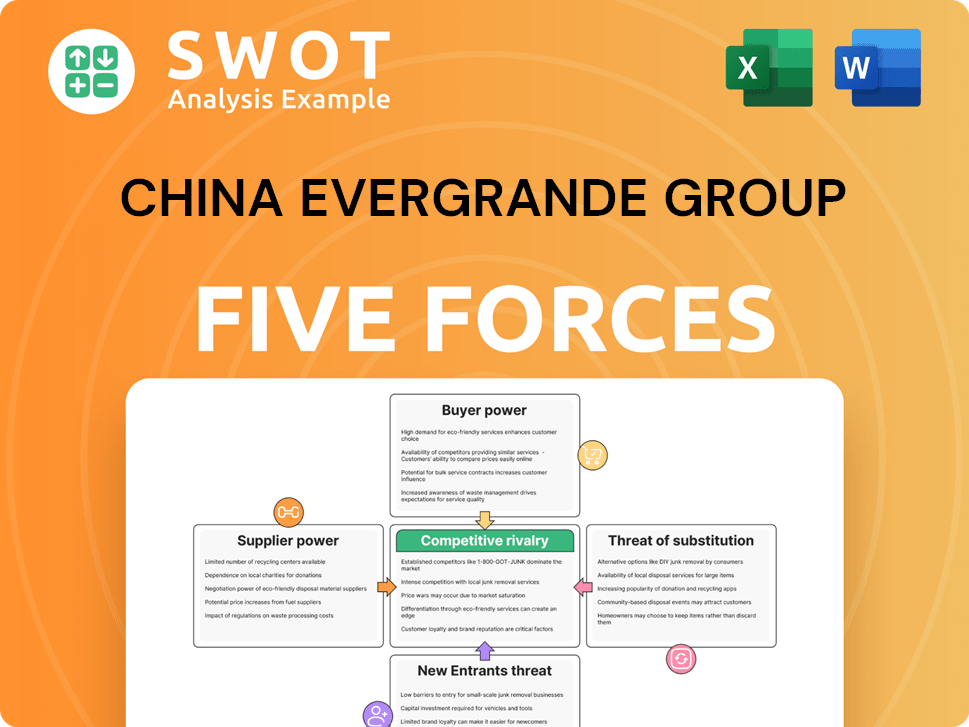
Related Blogs
- What are Mission Vision & Core Values of China Evergrande Group Company?
- What is Competitive Landscape of China Evergrande Group Company?
- What is Growth Strategy and Future Prospects of China Evergrande Group Company?
- How Does China Evergrande Group Company Work?
- What is Sales and Marketing Strategy of China Evergrande Group Company?
- What is Brief History of China Evergrande Group Company?
- What is Customer Demographics and Target Market of China Evergrande Group Company?
Disclaimer
All information, articles, and product details provided on this website are for general informational and educational purposes only. We do not claim any ownership over, nor do we intend to infringe upon, any trademarks, copyrights, logos, brand names, or other intellectual property mentioned or depicted on this site. Such intellectual property remains the property of its respective owners, and any references here are made solely for identification or informational purposes, without implying any affiliation, endorsement, or partnership.
We make no representations or warranties, express or implied, regarding the accuracy, completeness, or suitability of any content or products presented. Nothing on this website should be construed as legal, tax, investment, financial, medical, or other professional advice. In addition, no part of this site—including articles or product references—constitutes a solicitation, recommendation, endorsement, advertisement, or offer to buy or sell any securities, franchises, or other financial instruments, particularly in jurisdictions where such activity would be unlawful.
All content is of a general nature and may not address the specific circumstances of any individual or entity. It is not a substitute for professional advice or services. Any actions you take based on the information provided here are strictly at your own risk. You accept full responsibility for any decisions or outcomes arising from your use of this website and agree to release us from any liability in connection with your use of, or reliance upon, the content or products found herein.